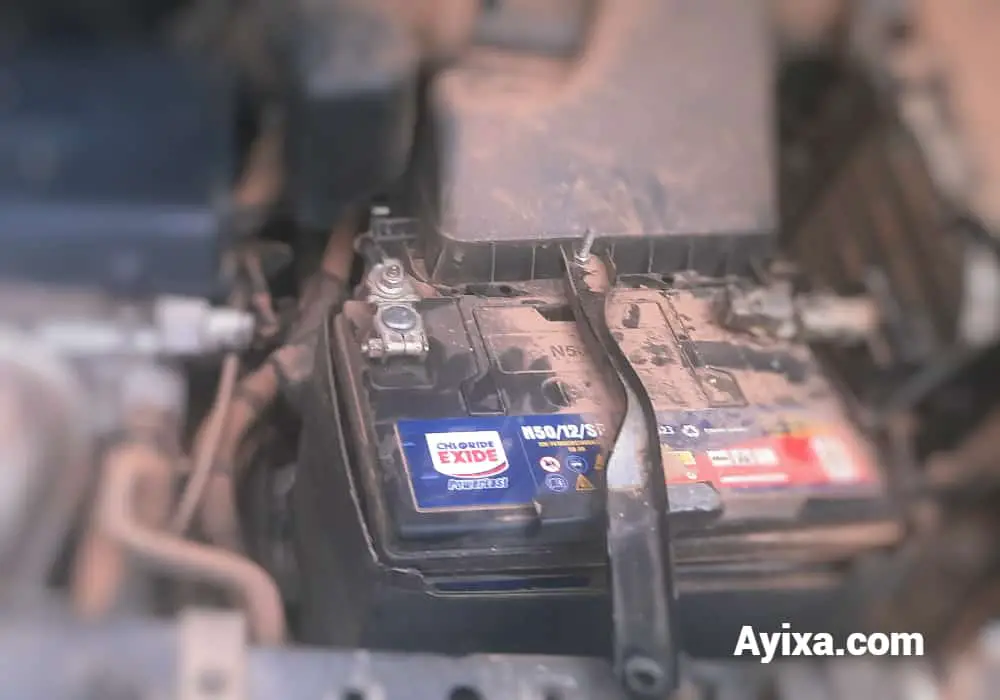If your car is not starting or cranks slower than usual, there’re several possible reasons why this may happen – from loose battery connections, parasitic drain on the battery, a bad alternator perhaps, and others.
It may also be possible that the battery is faulty – for example, it may have an internal short too.
So, what causes the internal short and how can you tell that the battery cells are shorting?
Read on for the signs of a shorting battery, and whether it is worthwhile fixing it.
Quick answer: It is possible for a car battery to develop an internal short. When this happens, the battery will not be able to attain, hold the recommended fully charged voltage or reliably supply power to the car’s electrical systems as expected.
Read on for more information.
Signs that a Car Battery has an Internal Short
(Note: This is not confirmatory)
If the car battery has an internal short-circuit then the car battery voltage will not rise and hold at the expected 12.65- 12.75V.
Additionally, you may experience:
1. Slow crank or car engine failure to turn over
The car engine may crank slowly or fail to crank at all because there’s not enough power available in the battery for the car starter to turn the car over.
2. Low battery voltage. In addition to not being able to turn the car over, the car battery voltage will be lower than usual, likely sub 12V. it may be as low as 10.4- 10.7V DC for a shorting cell.
A lower voltage of 8.42V DC may point to 2 battery cells with an internal short.
3. Extremely High battery temperature under charge. The car battery will be extremely hot to the touch to the point of not being able to hold it for a few seconds instead of being warm.
Warning: Use an infrared thermometer instead to measure the car battery temperature. Avoid Touching hot batteries can cause severe burns or injury!
What Causes a Car Battery to Short Out?
A car battery can develop an internal short as a result of wear and tear from regular use, especially as the battery ages.
Some battery types may be more prone to internal shorts. Be very picky when buying a car battery.
Only buy car batteries with good genuine reviews and where the manufacturer or supplier can accept returns too!
What Happens in the Battery?
In case of an internal short in your car’s battery:
- the separators ( they stop the positive and negative plates from touching) in one or more cells break down and fail so that the positive and negative plates start touching causing the short.
- It is also possible for some lead particles from the plates to fall to the bottom of the battery. Over time, they accumulate to such an amount that they start shorting out the cell plates from the bottom or the sides hence the internal short.
The internal short may develop as the car battery ages or if its build quality is not good.
End result?
The battery is no longer able to supply the necessary power to run the car’s electrical system – start the car or power the rest of the car accessories!
Should you Fix a Battery with a Shorted Battery Cell?
In my opinion, it is not worthwhile. You need a reliable battery that will not fail on you or expose you or the car to any danger from overheating and potentially an explosion.
Replace the car battery with another of the recommended capacity and quality to keep your car running for a long time!
Related questions
Should you Short-Circuit a Car Battery?
You should never short a car battery. Doing so risks injury to yourself and damage to the car and battery.
You could easily end up with the battery exploding, a large spark, or even an arc that welds or damages the car!
Follow the recommended guidelines when disconnecting and reconnecting the battery terminals to avoid short circuits.
For instance, always disconnect the negative terminal first when removing a car battery so that in the event that the positive terminal touches the car body it’s not grounded and there’s no short!
Connect the negative terminal last too to minimize the likelihood of a short circuit!
How to Test for a Short on the Car Battery
To test if there’s an internal short in the car battery, use a professional diagnostic tester.
It may not be specific but can indicate the “replace the battery” status
Additional testing at a reputable auto store will be required to check the battery cells are shorting.
Closing Thoughts
A car battery with an internal short may not attain or hold the fully charged voltage.
It can overheat during charging and its voltage may drop considerably below the 12V range, about 10.4 – 10.7V if one cell is shorting, and higher in case of more cells are short-circuiting.
Arrange to test the battery at an auto car repair facility or use a using a professional battery analyzer.
Related Posts
